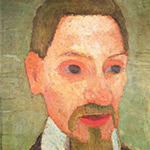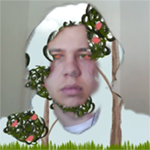The Dragonslayer
It was a beautiful and fruitful land with forests, fields, rivers, streets and cities. A king was placed over it by God. He was a hoary man, older and prouder than all kings about whom anything to be believed has been heard. This king’s only child was a girl of great youth, full of desire and beauty. The king was related to all of the neighboring thrones, but his daughter was a child and alone, as if without all relation. It is certain that her soft temper and her mildness and the power of her unawakened, silent presence were the unintentional cause of the dragon. For the more she grew and bloomed, the nearer it crept forward and finally alighted, like terror itself, in the forest of the most beautiful city in the land; for there exist secret relationships between the beautiful and the terrible – at a certain point they complete each other like laughing life and near daily death.
That is not to say that the dragon was hostile to the young lady, just as no one can say truthfully and in good conscience whether death is the adversary of life. Perhaps the great, seething animal would have lain down like a dog beside the beautiful girl and only for the repugnance of its tongue would have refrained from caressing those loveliest of hands in animal humility. But, of course, this was never put to the test, all the more so since the dragon was merciless toward all those who happened into the circle of its strength and, like visible death, grasped and held everything, herds and children not excluded.
The king at first remarked with great satisfaction, that the need and danger made many of the boys of his land into men. These young people of every station, nobles, seminary students and servants, who marched out as if into a strange and distant land, had the heroism of a single hot, breathless hour, in which they had life and death and hope and fear and everything – like in a dream. After a few years, it no longer occurred to anyone to count these brave sons and write their names down somewhere. For in such fearful times, the people grow accustomed even to heroes; they are no longer unheard of then. The feeling, the fear, the hunger of thousands scream out to them and they are there like a necessity, like bread, conditioned by those last laws which even in troubled times do not cease to function.
But as the number of those who martyred themselves after mounting hopeless defenses grew larger, as the last son in almost every family of the land — often still in boyish youth — had fallen, then the king began to rightly fear that all the firstlings of his land would perish, and that too many young girls would have to take upon themselves a virginal widowhood for the long years of the life of a childless woman. And he denied his subjects the struggle. But to the strange merchants, who fled the blighted land in nameless repulsion, he gave tidings that kings in similar situations have let circulate since days of yore. Whosoever should succeed in liberating the poor land from its great death shall win the hand of the king’s daughter, whether he be of noble birth or a hangman’s last son.
And it happened that strange lands were full of heroes too, and that the high reward did not fail to have its desired effect. But these sojourners were no luckier than the land’s inhabitants: they came only to die.
In those days there was a change in the daughter of the king; if till now her heart, oppressed by the sorrow and calamity of the land, prayed for the beast’s demise, since she had been promised to a strong, unfamiliar man, her naive feelings began to be bound up with the oppressor, with the dragon, to the extent that she discovered prayers for the dragon’s sake in the candor of her dreaming and requested that holy women take the monstrosity under their protection.
One morning, waking full of shame from such dreams, a rumor came to her that terrified and confused her. There was tell of a young man, who had come – God knows from where – to fight, and who did not succeed in killing the dragon after all, instead only tore himself, wounded and bleeding, from the claws of that horrible foe, and crawled his way into the thickest forest. There they found the unconscious man, cold in his cold, iron shell, and brought him into a house, where he now lay in a deep fever with hot blood behind the burning bandages. When the young girl received this news, she would have liked to run through the streets as she was, in a blouse of white silk, to be at the side of the deathly ill man. But once the chambermaids had clothed her and she saw her magnificent raiment and her sorrowful visage come and go in the many mirrors of the castle, the courage to do something so unusual left her. She could not even bring herself to send some reticent servant girl to the house where the sick man lay to give him some relief, fine linen or a mild salve.
But there was a disquiet in her that almost made her sick. At the incursion of night she sat for a long while at her window and sought to determine the house in which the strange man was dying. Since his death seemed self-evident to her. Only she could perhaps have saved him, but she was far too cowardly to search for him. This thought, that the life of the wounded had been placed in her hands, did not leave her. Finally, after the third day that she spent in torture and self-hatred, this thought pushed her out into the night, into the black, frightening, rainy spring night, in which she wandered around as if in a dark room. She did not know by what token she would discern the house that she sought. But without much delay she discerned it by a window that stood wide open, by a light that burned inside the room, a long, strange light, by which no one could read or sleep. And slowly she went past the house, helpless, poor, sunken in the first sadness of her life. She went further and further. The rain had stopped; over loose strips of cloud stood a few large stars and somewhere in a garden a nightingale sang the beginning of a strophe that she still could not finish. Again and again she began, questioningly, and her voice grew, large and forceful, from out of the silence, like the voice of some colossal bird whose nest rested upon the tops of new oaks.
When, finally, the princess raised her teary gaze from her long way, she saw a wood and a streak of morning behind it. And something black contrasted with the streak that seemed to draw nearer. It was a rider. Involuntarily she pressed herself into the dark, wet bushes. He rode slowly past her and his horse, black from sweat, shook. And he too seemed to shake: all the rings of his armor rang softly upon each other. His head was without a helmet, his hands were naked. His sword hung down, heavy and tired. She saw his face in profile; it was warm, with wind-blown hair.
She looked at him for a long time. She knew: he had killed the dragon. And her sorrow fell from her. She was not a confused, lost thing in this night. She belonged to him, to this strange, trembling hero, she was his possession, as if she were the sister of his sword.
And she rushed home to await him there. She entered her apartments unnoticed and as soon as it was possible she awoke her chambermaids and ordered her most beautiful clothes be brought. While she was being dressed the city awoke to great joy. The people celebrated and the bells nearly rang out of the towers. And the princess, who heard this clamor, knew suddenly that he would not come. She tried to imagine him immersed in the gratitude of the crowd: she was unable to do so. Almost fearfully did she seek to obtain the image of the lonely hero, the trembling one, as she had seen him. As if it were vitally important that she not forget. And with that her mood became so festive that, although she knew that no one would come, she did not interrupt the chamber maids who ornamented her. She ordered emeralds and pearls woven into her hair, which, to the great surprise of the serving girls, felt damp to the touch. The princess was done. She smiled at the chambermaids and went, somewhat pale, past the mirrors, with the rustling of her white trail following far behind her.
But the hoary king sat, worthy and earnest, in the high throne hall. The old paladins of the realm stood around him and shone. He waited for the strange hero, for the liberator.
But he was already riding far from the city, and the sky above him was full of larks. Had someone reminded him of the reward for his deed, perhaps, laughing, he would have turned around; he had forgotten it completely.
Translator’s Note:
This is Rilke’s last prose work before the Notebooks of Malte Laurids Brigge. Though someone has likely translated it into English, I have not been able to find it published anywhere. In spite of its great beauty and surprisingly mature Rilkean thematic, it seems to have largely been forgotten.
Written in the style of a fairytale, this is a story of a dragon that descends upon a kingdom, a king who promises his daughter to whomsoever should slay it, and two would-be heroes. Folk- and fairytales are often conceived of as the collective fantasy of a people – it is this aspect that makes them so fundamental to national ideologies. They are a receptacle and conduit for the pure will of a people, and thus, for nationalists, clear indicators not only of what that people is, but what that people should be. Rilke’s The Dragonslayer resembles a fairytale, but its narrative is centered around the incommensurability of fantasies. If a normal fairytale proceeds according to the logic of a dream, Rilke’s story proceeds according to the logic of dreams, numerous and discrete, which like parallel lines never meet. In this world, consummation is utterly impossible, even when all of its requirements are met.

Rainer Maria Rilke needs little introduction. He is probably the best-known German poet of the 20th century. Besides his Notebooks of Malte Laurids Brigge, his prose work is rarely studied but deserves increased attention.

I am a writer, translator, and student of Comparative Literature at the Freie Universität Berlin. I am particularly interested in the relationship between Yiddish and German literature. I previously translated Rilke (The Solution to the Jewish Question) for New Voices. My translation of the German Expressionist novel Spook by Klabund will be published by Snuggly Books in the spring of 2022.

 BACK TO ISSUE
BACK TO ISSUE